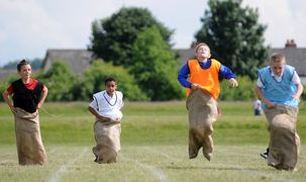 There are many ways in which to raise well turned out children. For simplicity, it’s possible to split parents into two schools of thought: The ‘School of Freedom’ says let them decide, children should be allowed to have lots of fun because laugh is hard enough and they should decide what activities that they want to get involved in because it’s their life. Frequently such parents will also argue that there’s too much competition in school so it takes the fun out of learning. The ‘School of Structure’ says set them up with a time table of activities that will give them what you as a parent believe is the best chance in life. Such parents may spend hours taking their kids from one after class activity to the next, they’re probably also paying for private tutors to top-up on the schooling. You will frequently see parents that fall at either extreme end of the spectrum put together on shows like Wife Swap (UK or USA) or Trading Spouses. Every time both sets will move a little closer to the center as they realize their kids either have way too much freedom or indeed too much structure. I was just watching the Finale of Junior MasterChef when these thoughts were swimming around in my head. I love watching junior competitions even more than the adult versions firstly, because although it is just as competitive the feedback is always very constructive and even the criticisms are given in the best light. The judges don’t want to be seen as utterly discouraging so they use all the tact that they can. Secondly, the children are frequently so unaware of themselves that they are not overly cautious; they don’t carry all of the nerves that adult competitors tend to. If you watch the finale of Adult MasterChef you can literally feel the tension in the room. There was a child on today’s Final of Junior MasterChef cooking something that she had never cooked before, she knew it was risky but hoped that by following the recipe it would turn out okay. So sweet, so innocent. You hardly ever (probably, never) see these sorts of risks in adult competitions; competitors have normally cooked their chosen dish many times. Junior MasterChef does allow the kids more time so that will in itself reduce the stress but my previous points still hold. You can clearly see that I believe in providing a fair amount of structure and I’m very open to competing. Kids don’t know enough about life to decide for themselves. You learn what you like and what you don’t like through exposure. You gain exposure by taking part in an activity. A child comes to understand that there are different ways of doing things by being taught; sometimes even the most basic things need to be taught. For instance, when I was a five or six year old child, I went into the loo when my dad was brushing his teeth because I was desperate and couldn’t wait. When I was done, I pulled up loads of tissue, scrunched it up into a ball and wiped, as you do. “That’s not how you use toilet paper,” my dad said. He proceeded to take four strips, folded them neatly, and said “This is how you do it.” I had never until that moment thought that there was another way. My pa is an extremely organized person. He’s the perfect combination of flexible and structured; there are many things I learnt by observing him but there are so many others I had to be taught or told. One of my best friends deeply regrets telling her mum she didn’t want to do ballet or classical dancing when she was in primary school. She wishes that her mother had made her do it anyway. At the age of 18, her regret was too late, anyone forging a career in dance had been doing it for over a decade, she felt that she was so behind the curve that there was no point in even trying. By the time she had mastered the necessary skills, she thought she would have been too old to succeed! Providing structure doesn’t mean making your kids super academics, it’s probably even more important if your child is not academic. School is always going to be slanted more towards the scholarly pursuits, if you feel your child is not that way inclined fill their free time with dance, music, art, sport – not with video games! It’s a dog eat dog life out there and you can’t protect kids from that. The more you try to protect, the more you could be causing them harm in the long run: they might not be able to take the pressure once they are thrown into the real world. There are tons of super ambitious, super smart people out there and the quicker you embed a work ethic in your kids, the better. Where do you fall in the freedom versus structure spectrum?
6 Comments
Reena
9/8/2016 09:27:35 am
I fall somewhere in the middle. You don't want to have kids following a super regimented life that is all discipline and no fun and no individuality - kids should be allowed to have fun and some freedom. At the same time you don't want to raise a brat that is all about expressing himself or herself and has no respect for his / her elders. Kids should know the rules so that they are able to follow them but they must also have a chance to express their individuality. All very well in theory and I don't have kids yet so perhaps its easy for me to comment. In my view, so many kids nowadays are allowed too much freedom. We're raising a generation of superbrats who believe that the world owes them a favour.
Reply
Heather KW
9/8/2016 09:30:49 am
I think you are able to be more objective before you have kids.
Reply
Fiona
9/8/2016 09:28:21 am
I believe in structure, freedom, structure--in that order. Like you clearly pointed out, a child must be told that 1+1=2 to prevent them fumbling about life trying to discover this for themselves, eventually succeeding at 48, and thinking they are some sort of Columbus when the world has already got this knowledge. Its important that kids should be given a plethora of activities, academic and otherwise, under strict structure so that they gravitate towards their interests and talents--fingers crossed, these two coincide. Very much like pre-GCSE KA. After this structured exposure must come the freedom to chose what they are interested in; once the choice has been made, discipline and structure must take root again, to bring that single-mindedness that is prerequisite to the mastery of an art, mastery which is a prerequisite in a "dog-eat-dog" world. Nevertheless, I do believe in a certain amount of just plain freedom during all this structured time- an hour a day-maybe two, where the kid can just do whatever. This way not only can they invest more time on their own in what they are gravitating towards e.g reading biology books not on the syllabus, but also perhaps engage in those interests which will become a part of their lives that you are unable, or do not think, to add to their timetable e.g gardening.
Reply
Heather KW
9/8/2016 09:40:26 am
I do like your thoughts on the subject too. What does one do if their child shows no interest in anything except playing??
Reply
Luke Flegg
9/8/2016 09:41:29 am
"Kids don’t know enough about life to decide for themselves."
Reply
Heather KW
9/8/2016 09:44:02 am
@ Luke: the opposite is actually true for me. Growing up my parents let me make my own decisions all the time: I had no bed time nor was I ever forced to follow a given schedule. However, I grew up in a world with few distractions, limited TV, no internet and it was still safe to play outside unmonitored.
Reply
Leave a Reply. |
By Heather
|
Heather Katsonga-Woodward, a massive personal finance fanatic.
** All views expressed are my own and not those of any employer, past or present. ** Please get professional advice before re-arranging your personal finances.

 RSS Feed
RSS Feed


